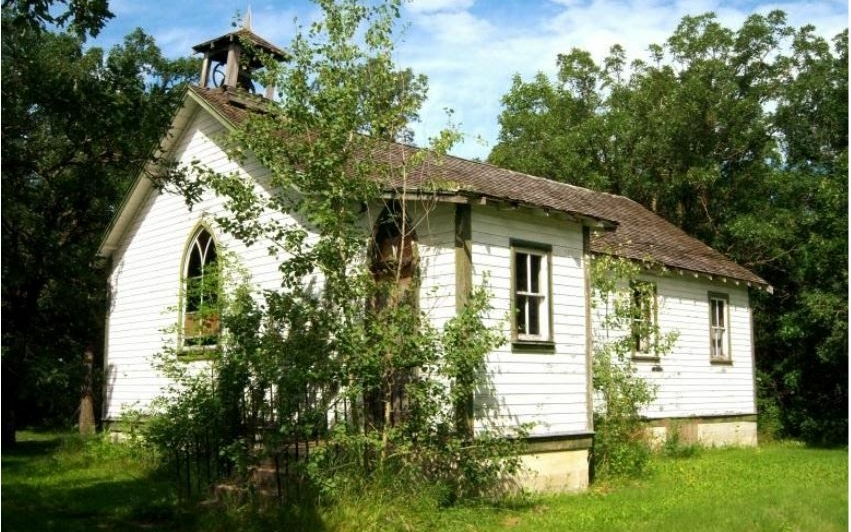Presbyterians have been prominent in Manitoba’s political, social, economic, and religious history since the start of colonial times. MacKenzie Presbyterian Church was their meeting place in St. Clements.
In 1919 Mary MacKenzie moved to East St. Clements at the age of 58. Although she had planned to retire as the widow of Reverend Ewan MacKenzie, she ended up starting a Sunday School in her home. When the group became too large, she rented a tent for the summer and built a shanty for the winter. In 1921 the Women’s Missionary Society assumed financial responsibility for her mission work, which included Red Cross work during the war.
In 1930 Mary MacKenzie donated property for the creation of the All People’s Mission Church. The Women’s Missionary Society, and a few interested friends, saw the importance in MacKenzie’s work and helped her in the construction of this church. It was a wood-frame building built by a Winnipeg construction company, slightly north of where it currently stands. The bell was donated by the women of Knox Crescent Church in Montreal.

After her death on December 6, 1948, the name of the church was changed to MacKenzie Presbyterian church in honour of its founder. Although the church was originally located on the north end of the property, in approximately 1975 it was moved to its present site. The site of MacKenzie church is currently located on Lot #120 Old Henderson Hwy (PTH #204).
The church held active services from 1930 to the early 1980s. In the later years alternate services were held between MacKenzie and St. Andrews Church in Kirkness. MacKenzie Presbyterian church has not be used for active services since the early 1980s.
MacKenzie Presbytarian – Old Henderson Highway
MacKenzie Presbyterian geocache site is located near East Selkirk, Manitoba, Canada at N 50º 06.610´ latitude and W 96º 55.460´ longitude. If you find the geocache and scan the QR code inside of it, it brings you here to learn more. Watch all of our videos on our YouTube Channel. Other heritage content can be found on our Red River North Heritage Youtube channel.
Transcription:
By the time Mary MacKenzie arrived in St. Clements, she was building on a long history of Presbyterian faith in Manitoba. The first Presbyterians in the province came as employees of the Hudson’s Bay and Northwest companies, although they were not organized in church bodies.
The first Presbyterian service was held by a group of the Red River settlers in 1815 at York Factory. The considerable number of Scottish Presbyterians in the Red River colony waited until 1851 for their first minister.
John Black’s arrival marked the beginning of firmly establishing the Presbyterian church in Manitoba and started to expand its impact through the gospel.
The first congregation to organize in the St. Clements area was at Little Britain, where a log-built structure, called “The Meeting House”, went up in 1852. It also functioned as a school and library.
With confederation came new progress, and varied services aside from gospel witness.
The Presbytery of Manitoba formed in 1870, and Manitoba College in 1871. The College became one of the founding institutions of both the University of Manitoba and the University of Winnipeg.
Aside from education, Presbyterians served in government. Manitoba’s first two lieutenant governors, Adams George Archibald and Alexander Morris, were both devout Christians of Presbyterian adherence.
The church in the province expanded rapidly under the ministry of James Robertson, who became pastor of Knox Church in Winnipeg in 1874. Robertson’s work led to the founding of numerous churches, raised large amounts of money for missionary work, and inspired many people to become missionaries themselves.
By 1885, the Presbyterian church in Manitoba was so large that the province was broken into several Presbyteries under the synod of Manitoba.
The church maintained its size and impact until 1925, when two thirds of Presbyterians joined with the Methodist and Congregationalist churches to form the United Church of Canada.
The rest, including MacKenzie Presbyterian in St. Clements and Knox Presbyterian in Selkirk, continued on under the old name.